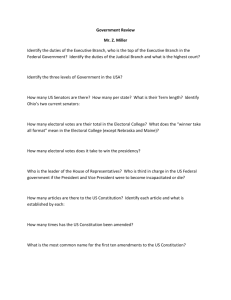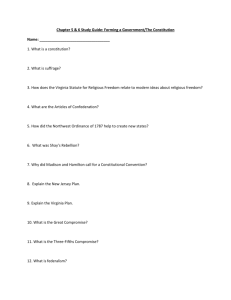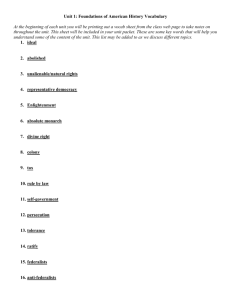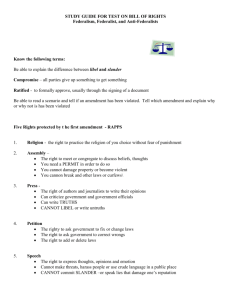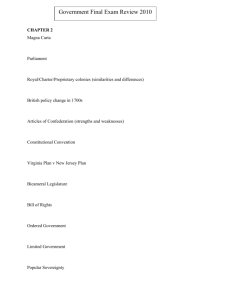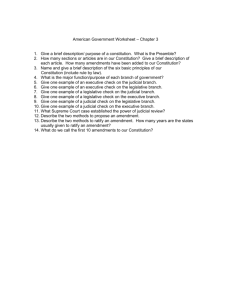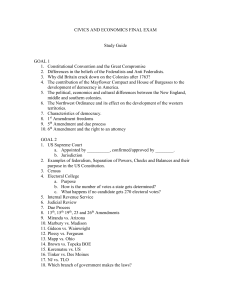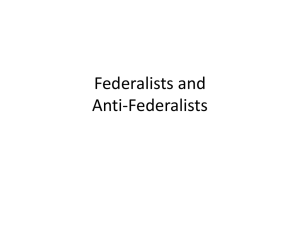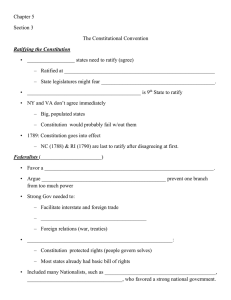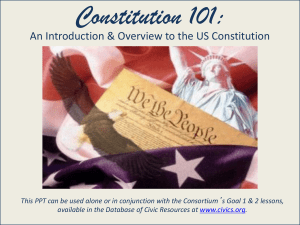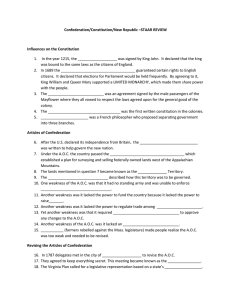Civics and Economics Midterm Review! Part 1: Duties
advertisement
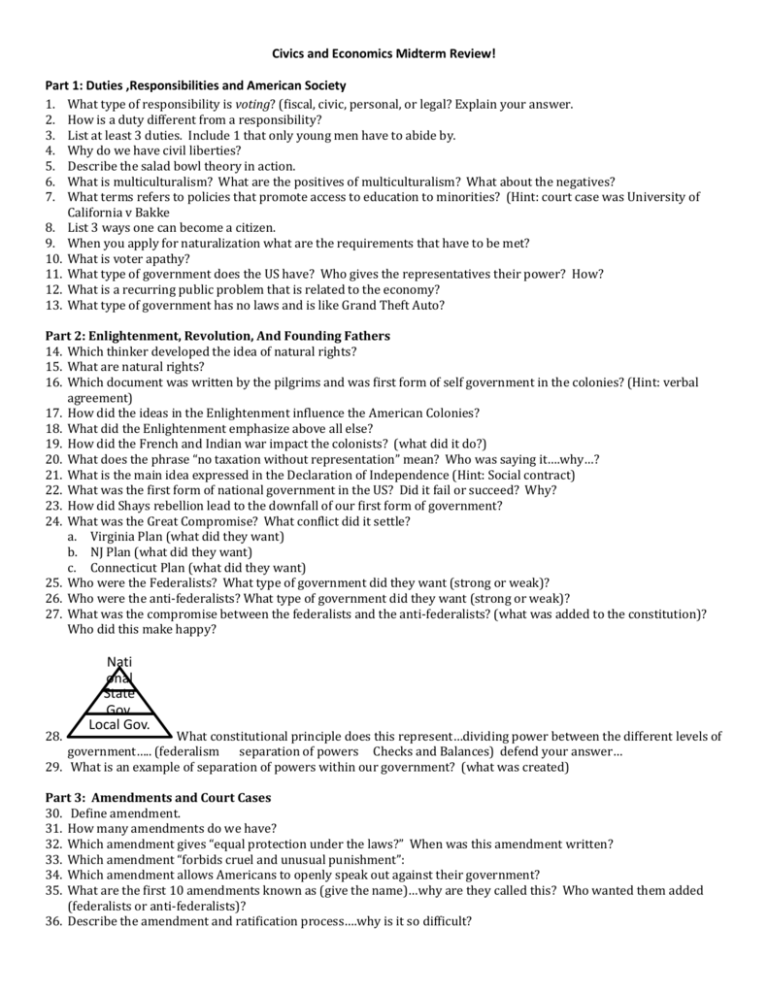
Civics and Economics Midterm Review! Part 1: Duties ,Responsibilities and American Society 1. What type of responsibility is voting? (fiscal, civic, personal, or legal? Explain your answer. 2. How is a duty different from a responsibility? 3. List at least 3 duties. Include 1 that only young men have to abide by. 4. Why do we have civil liberties? 5. Describe the salad bowl theory in action. 6. What is multiculturalism? What are the positives of multiculturalism? What about the negatives? 7. What terms refers to policies that promote access to education to minorities? (Hint: court case was University of California v Bakke 8. List 3 ways one can become a citizen. 9. When you apply for naturalization what are the requirements that have to be met? 10. What is voter apathy? 11. What type of government does the US have? Who gives the representatives their power? How? 12. What is a recurring public problem that is related to the economy? 13. What type of government has no laws and is like Grand Theft Auto? Part 2: Enlightenment, Revolution, And Founding Fathers 14. Which thinker developed the idea of natural rights? 15. What are natural rights? 16. Which document was written by the pilgrims and was first form of self government in the colonies? (Hint: verbal agreement) 17. How did the ideas in the Enlightenment influence the American Colonies? 18. What did the Enlightenment emphasize above all else? 19. How did the French and Indian war impact the colonists? (what did it do?) 20. What does the phrase “no taxation without representation” mean? Who was saying it….why…? 21. What is the main idea expressed in the Declaration of Independence (Hint: Social contract) 22. What was the first form of national government in the US? Did it fail or succeed? Why? 23. How did Shays rebellion lead to the downfall of our first form of government? 24. What was the Great Compromise? What conflict did it settle? a. Virginia Plan (what did they want) b. NJ Plan (what did they want) c. Connecticut Plan (what did they want) 25. Who were the Federalists? What type of government did they want (strong or weak)? 26. Who were the anti-federalists? What type of government did they want (strong or weak)? 27. What was the compromise between the federalists and the anti-federalists? (what was added to the constitution)? Who did this make happy? 28. Nati onal State Gov. Gov. Local Gov. What constitutional principle does this represent…dividing power between the different levels of government….. (federalism separation of powers Checks and Balances) defend your answer… 29. What is an example of separation of powers within our government? (what was created) Part 3: Amendments and Court Cases 30. Define amendment. 31. How many amendments do we have? 32. Which amendment gives “equal protection under the laws?” When was this amendment written? 33. Which amendment “forbids cruel and unusual punishment”: 34. Which amendment allows Americans to openly speak out against their government? 35. What are the first 10 amendments known as (give the name)…why are they called this? Who wanted them added (federalists or anti-federalists)? 36. Describe the amendment and ratification process….why is it so difficult? 37. Which court case established Judicial Review, the power for judicial branches to review the action of other branches? 38. Which supreme court case established the idea of “separate but equal” as constitutional…or legal…: 39. Which court case overturned Plessy v Furguson and led to desegregation of schools (integration= mixing): 40. Which court case says your rights must be read to you? Part 4: Who has the Power….? 41. Which type of power allows only the national government to carry out? (reserved implied concurrent) a. Give an example of this type power: 42. Which part of the NC Constitution guarantees its rights to its citizens? a. Where are our rights listed in the US Constitution? 43. Which type of power allows for Congress to carry out “all necessary” laws even if it isn’t written (reserved implied concurrent) a. Give 2 examples of this type of power: 44. Which branch of government is responsible for creating laws? 45. Describe the bill-making process (look at your foldable)…what happens if it only passes through one house of congress? 46. How can citizens propose new laws for their state? 47. What does the role of Commander in Chief allow the president to do? 48. Who becomes president if they die? 49. Who is the leader of NC (like the President…but for NC)? 50. What type of court cases does the Supreme Court hear? a. What is “hear on appeal”? 51. Which branch can override a president’s veto of a law? 52. How can the legislative check the power of the judicial branch? a. What does the word impeachment mean? Part 5 Elections 53. Label the political spectrum above: Moderate Liberal Conservative 54. Which step in the presidential election is the party candidate officially nominated? 55. Where do most American’s fall on the political spectrum? 56. Where do Democrats and Republicans typically fall on the political spectrum? a. Where do you fall? What does this mean? 57. Who actually formally elects the president? a. Why is the electoral college controversial? b. How can the electoral college limit the voting power of citizens? c. Why did the framers of the constitution create the Electoral College? 58. What is the main purpose of propaganda? a. List 3 Propaganda techniques are the most influential 59. What is the primary goal of a Special Interest Group? a. List one Special Interest Group and explain how they can try to influence public policy (lawmaking) 60. How do Political Action Committee’s influence elections? 61. Which step in the election do members of a single party run against eachother? 62. Drawing an odd shaped political boundary to favor a certain group is called…… 63. Who gets to participate in a closed primary? Open primary? 64. List the 4 steps in an election….include the major activities at each step… Short Answer: 65. How is the idea of democracy acted out in the United States? Explain why it is so important for people to participate, and give at least two examples of how people can influence our government. (3 pts) 66. In your opinion, which of the three branches of government is most powerful, if any? Justify your opinion, and include at least two branch powers that prove your point. (3 pts)
